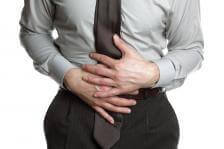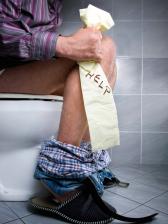Treating Constipation
What is the number one gastrointestinal problem for children and adults in the U.S.? You’d be surprised to learn that it’s constipation. House Call Doctor explains the top causes and treatments for this condition. Plus – how to know if your constipation is actually a sign of something more concerning.
Sanaz Majd, MD
Listen
Treating Constipation

Answer: Heartburn and acid reflux are quite common and possibly a close second. But the most common tummy issue is actually constipation.
Why is constipation so common these days? With our fast-paced, work-driven, free-time-deprived world, it’s become more challenging to take the time to think about what we eat. We tend to eat on the go, eat more fast-food, eat out instead of in, and leave little time to prepare ahead for our meals. We are just a more pooped-out society (no pun intended). And because of this less-than-optimal nutritional intake, we experience more difficulties staying regular with our bowels.
Another pop quiz: Have you heard about the new movie Constipation?
Answer: Never mind, it hasn’t come out yet.
Okay, that was a crappy joke (pun intended), but we are going to find out how to launch its release in today’s episode..
What Is Constipation?
Does it mean you are constipated if you don’t have a bowel movement every day? I get asked that question a lot. But not everyone needs to empty out their inner tubings every day. People’s anatomy and physiology vary – some people normally stool every day, and some every 2 to 3 days and it may still be normal for them. What is not normal, however, is if you are experiencing other uncomfortable symptoms along with less frequent stooling, such as:
- abdominal pain or discomfort
- sensation of bloating or fullness
- straining with your bowel movements
- small amounts of stool at a time
- skinny or pencil-thin stool
- feeling of incomplete evacuation
- blood in your stool
- pain with defecation
- hard stools
So if you have a bowel movement every 2-3 days, your bowel movements are as soft as toothpaste, and you have no other discomfort, then it’s all A-Okay. Otherwise, you may need to consider some modifications to your diet.
Top 8 Causes of Constipation
Poor nutritional intake is by far the most colonic culprit of constipation, but there are a few other medical problems that can cause constipation as well. And if it’s a chronic issue for you, it may be wise to see your doctor to make sure that you don’t suffer from the following medical conditions that can predispose you to constipation, such as:
Diabetes
- Hypothyroidism
- Neurologic disorders (such as Multiple Sclerosis or Parkinsons)
- Eating disorders
- Bowel obstructions
- Colon cancer
- Medication side effects
- Irritable Bowel Syndrome
How to Manage Constipation
Before you force your spouse to make a run for the nearest drug store in search of a few gallons of your favorite laxative, let’s talk about how to properly medically manage constipation. Laxatives should be used sparingly and infrequently, for severe acute bouts of constipation, and for some patients not at all. Don’t allow your body to become dependent on laxatives to have a bowel movement.
The best way to treat constipation is really to prevent it from happening in the first place. This may take some time and effort on your part to change some lifestyle habits, but your bowel will certainly thank you for it (in regularly recurring payments, of course):
- Fiber: Most adults require 5 servings of fruits and veggies a day, or somewhere between 20 and 35 grams of fiber per day. Opt for 2 servings with each meal, and in that way you shoot for 6. If you can’t eat that many veggies and fruits, then it may be time to supplement with over-the-counter psyllium or fiber supplements that you can find at your local drug store.
- Fluids: When increasing fiber, you also have to match the increase in fluid intake as well, because otherwise you may feel more bulky and bloated. Also, caffeine and alcohol are diuretics that increase urination – that means that they can dump (no pun intended) much-needed fluid into your urine rather than keeping your stools from hardening. Limit coffee, tea, sodas, chocolate, and alcohol, and sip on water throughout day.
- Prunes: Prunes are great natural stool softeners and they are actually delicious. Snack on prunes daily.
- Stool softeners: Of course it’s always best to modify your lifestyle before considering medications, but there are over-the-counter stool softeners (not laxatives) that can be taken daily to loosen things up. One example is generic docusate sodium.
When the constipation is severe, your doctor may consider a temporary laxative, an enema/suppository, or the patient-dreaded manual disimpaction (yes, that means your doctor needs to manually remove the impacted poop through your rectum), although that’s usually a last resort.
When Is Constipation Concerning?
Constipation is common, and most of us have experienced it at some point or other. It may be easy to ignore for some when it’s mild, short-lived, and easily managed at home. However, it can also indicate something more concerning if other symptoms are also present, such as:
- Rectal bleeding or bloody stools
- Weight loss
- Family history of colon cancer
- Severe abdominal pain
- Change in consistency or size of the stool
- Chronic nature
- Refractory to typical treatments
- Severe
- Associated with nausea or vomiting

So now that you know more than you may have ever wanted to know about your poop, don’t suffer another day with discomfort and make some lifestyle changes to regulate your bowel movements right away.
Share your ideas and learn more quick and dirty tips with us on the House Call Doctor’s Facebook and Twitter pages!
Please note that all content here is strictly for informational purposes only. This content does not substitute any medical advice, and does not replace any medical judgment or reasoning by your own personal health provider. Please always seek a licensed physician in your area regarding all health related questions and issues.


